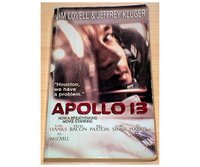Woolgathering Conservators of Extraterrestrial Memoirs,
I finally managed to acquire a copy of the book - an old stained and smelly paperback that cost £1.25 over EvilBay – that my absolute favourite filum is based on, Apollo 13 or Lost Moon (as it was originally titled) which was written by Apollo 13 Commander Jim Lovell with Jeffrey Kluger. Although the book is written by Jim Lovell, the story of the failed Apollo 13 m ission is told in the third person and this often made me forget that I was reading a work of non-fiction but it was the correct choice for the book. As explained in the notes, there are many more aspects to the extraordinary events that took place and although the abundance of different people in different jobs is sometimes confusing, what I sensed most was Jim Lovell’s gratefulness to the hundreds of people in Mission Control who guided his sick spacecraft back to Earth. The book, like Moondust, is very well researched, the authors carried out interviews with all the members of mission control mentioned and Jim Lovell’s family and friends and the high esteem Jim Lovell holds everyone in is very clear from the detail and respect with which their roles are described. As well as the interviews, the authors have used recordings and transcriptions of all the conversations that took place at Mission Control, Houston during the Apollo 13 mission to ensure the book is factually accurate.
ission is told in the third person and this often made me forget that I was reading a work of non-fiction but it was the correct choice for the book. As explained in the notes, there are many more aspects to the extraordinary events that took place and although the abundance of different people in different jobs is sometimes confusing, what I sensed most was Jim Lovell’s gratefulness to the hundreds of people in Mission Control who guided his sick spacecraft back to Earth. The book, like Moondust, is very well researched, the authors carried out interviews with all the members of mission control mentioned and Jim Lovell’s family and friends and the high esteem Jim Lovell holds everyone in is very clear from the detail and respect with which their roles are described. As well as the interviews, the authors have used recordings and transcriptions of all the conversations that took place at Mission Control, Houston during the Apollo 13 mission to ensure the book is factually accurate.
Lost Moon is a captivating read and for people, like me, who have a fascination with but not an encyclopaedic knowledge of space and are interested in what happened aboard Apollo 13 or enjoyed the Ron Howard’s Apollo 13, I’d highly recommend acquiring a copy.
Amazingly, I still have respect for the screenplay after reading the book, Ron Howard has changed certain elements of Lost Moon but on the whole it remains loyal to the book. Whilst Mission Co ntrol Flight Director, Gene Kranz, played by Ed Harris, was undoubtedly central to saving the lives of the Apollo 13 crew, it was only through reading the book that I learned that there were 3 other Flight Directors on rotation with Gene Kranz during Apollo 13. Ron Howard sold the some of events leading up to Jim Lovell’s Apollo 8 mission as the sequence of events leading up to Apollo 13. Interestingly, the filum portrays Ken Mattingly, the astronaut who was controversially grounded because he wasn’t immune to the case of rubella, as the hero whose individual work in the simulator was the key to the rescue of his former crew-mates but in reality, fellow Apollo 13 back-up crew members,
ntrol Flight Director, Gene Kranz, played by Ed Harris, was undoubtedly central to saving the lives of the Apollo 13 crew, it was only through reading the book that I learned that there were 3 other Flight Directors on rotation with Gene Kranz during Apollo 13. Ron Howard sold the some of events leading up to Jim Lovell’s Apollo 8 mission as the sequence of events leading up to Apollo 13. Interestingly, the filum portrays Ken Mattingly, the astronaut who was controversially grounded because he wasn’t immune to the case of rubella, as the hero whose individual work in the simulator was the key to the rescue of his former crew-mates but in reality, fellow Apollo 13 back-up crew members,
I love both the filum and the book, and I’ll still be able to watch the filum and when watching with company, use my well-worn joke that works on almost negligible levels. When Jim Lovell gazes out the window of the spacecraft towards Earth, the director cuts to Marilyn Lovell moving towards the kitchen window where she stares at the night sky, I whisper, “She can see him.”

0 Comments:
Post a Comment
<< Home